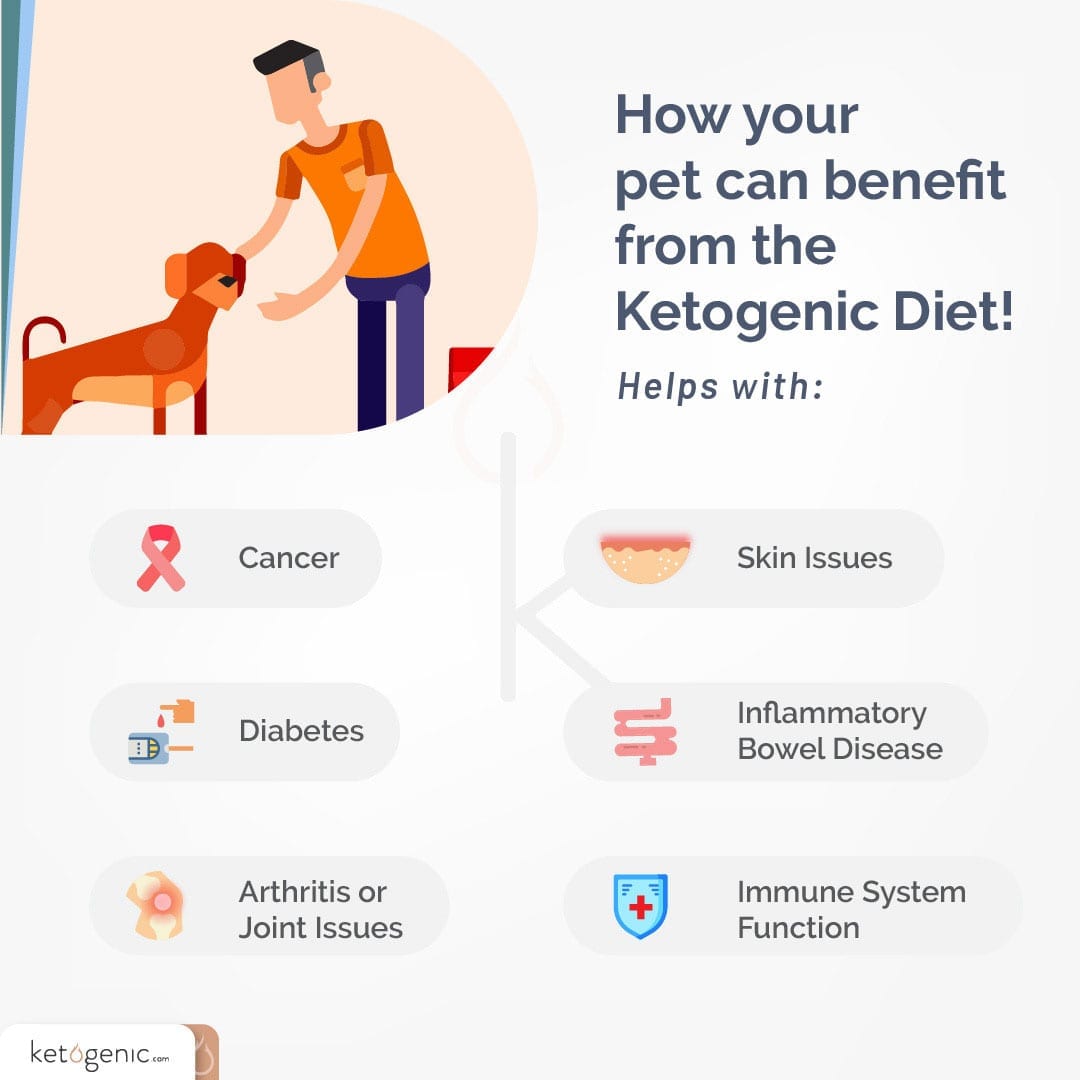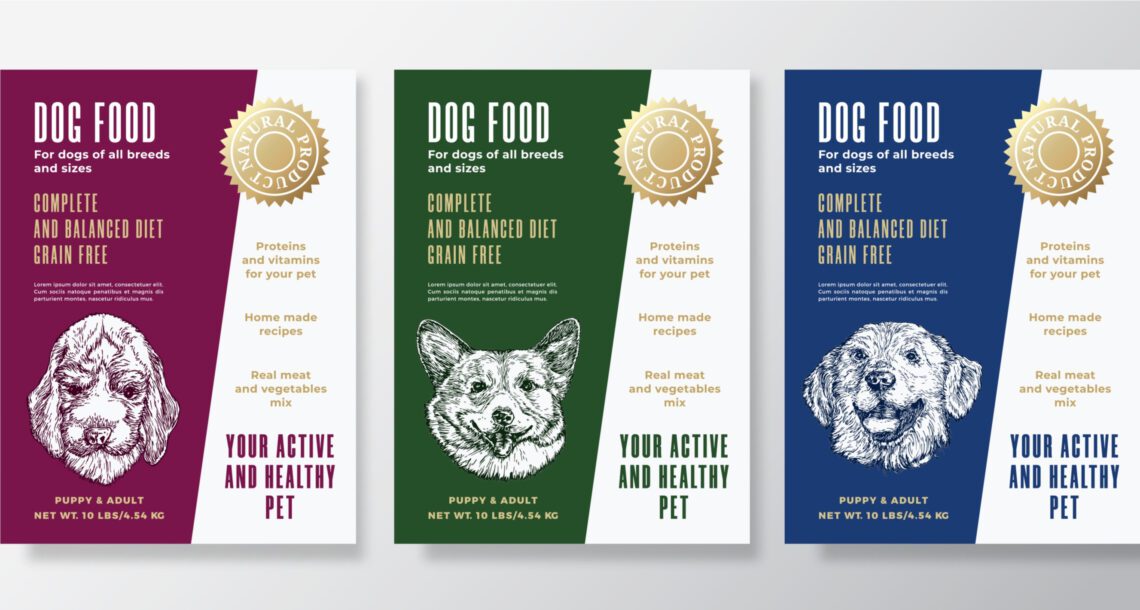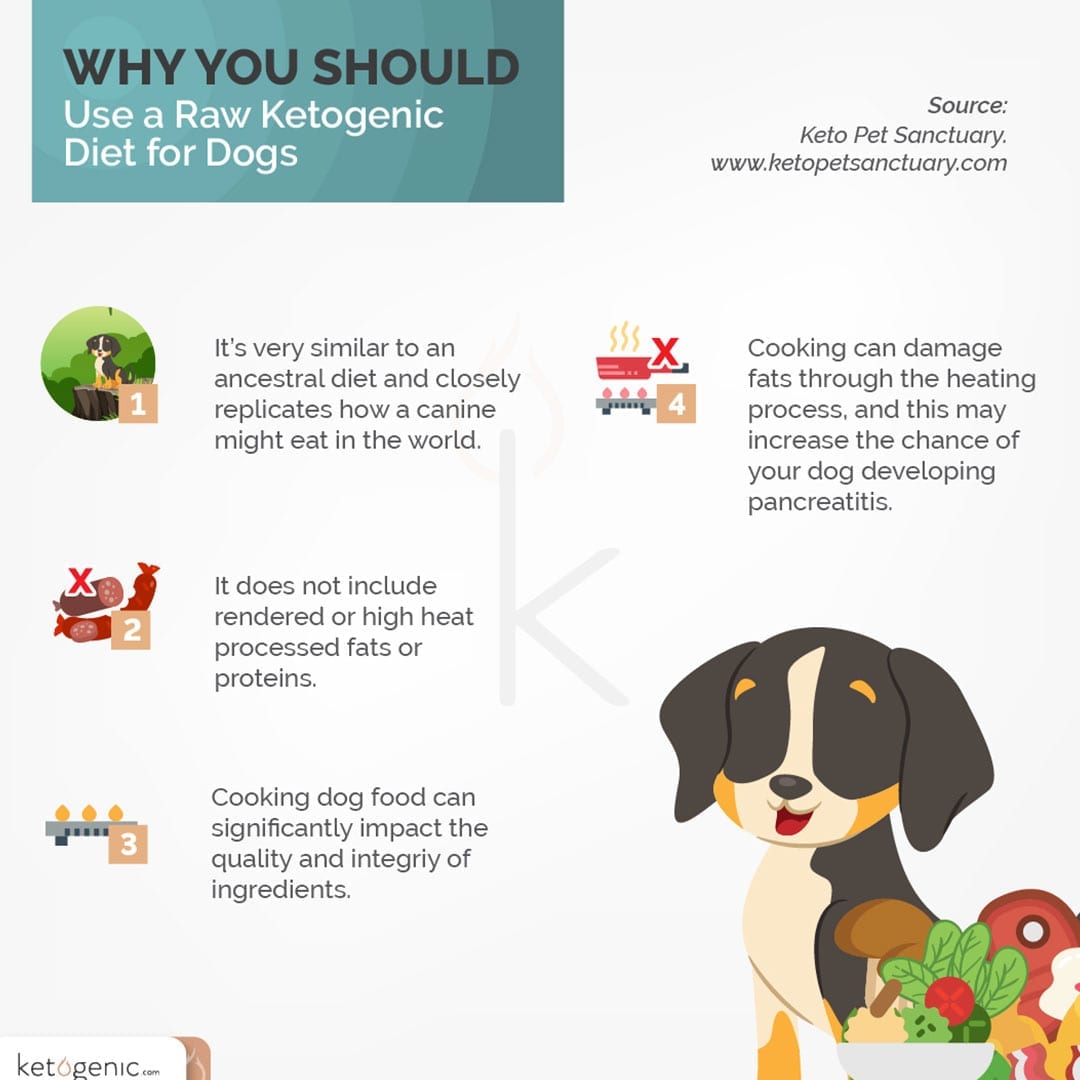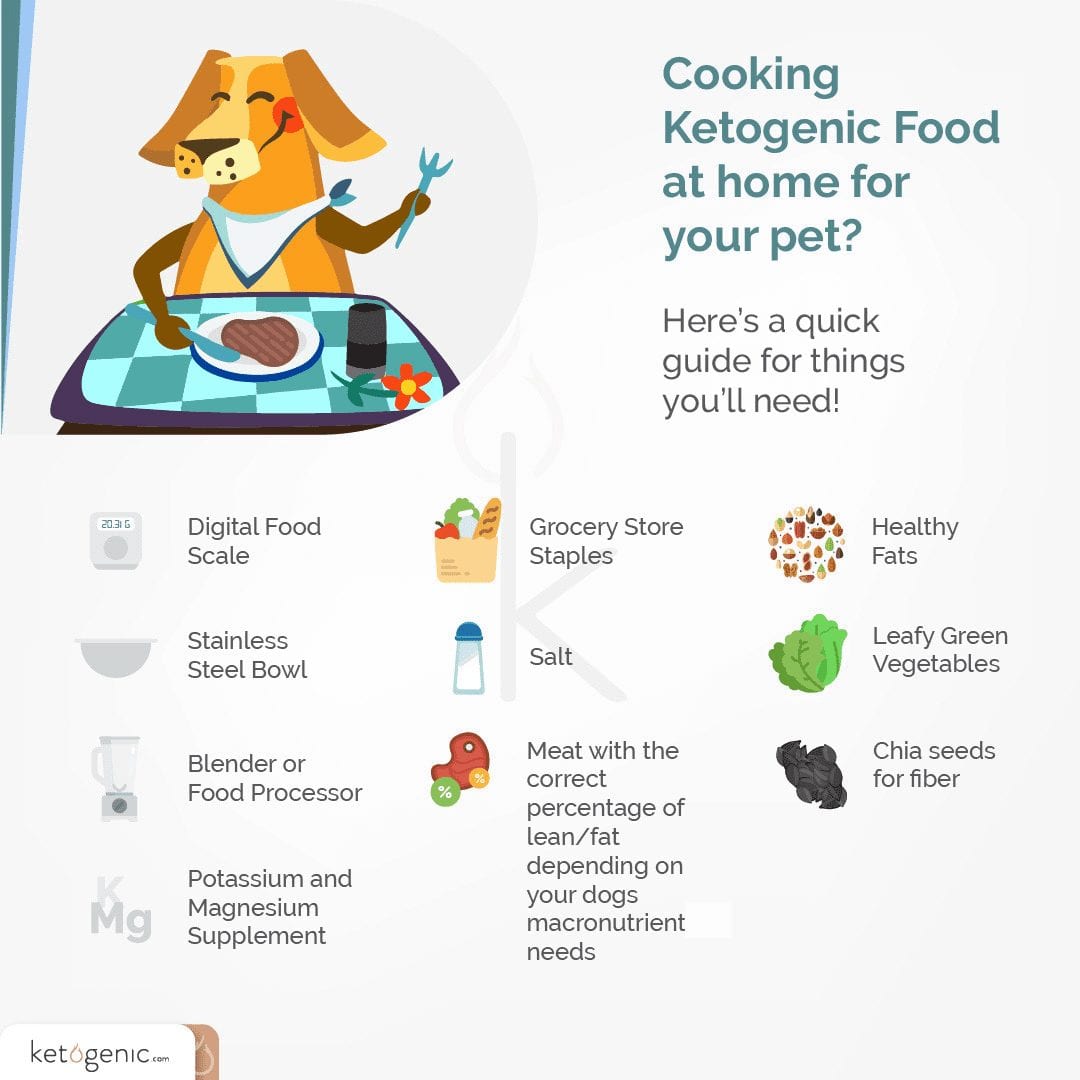
You admit you love your pup like your own furry child, an important family member who only deserves the best! The wagging tail, the doughy eyes, and the little smile melt your heart every day. Since you know about the benefits of the ketogenic diet for humans, you’ve started wondering if keto can benefit your dog too. So, can a low-carbohydrate, higher-fat protocol be advantageous for those cute canines? Let’s discuss research, opinions, and options for a ketogenic diet for dogs.
Keto and Dogs
The largest focus on keto for dogs is on disease management and prevention, particularly with cancer. The research on humans and cancer is compelling, and research is continuously emerging for dogs, too, with hundreds of thousands of research articles along with reports from pet owners and veterinarians worldwide.
Keto is a low-carb, high-fat, and moderate-protein diet where your doggie’s body switches to burning fat for fuel instead of carbohydrates (glucose). You might think your primarily carnivorous doggie is already low-carb, high-fat, and moderate protein with the dog food you bought from the stores, but this isn’t true in most cases.
In the wild, predatory animals like your pooch would consume a low percentage of carbohydrates, with some people stating as low as 3 to 5%. A vegan diet isn’t usually recommended for canines since it can lead to deficiencies of vital nutrients and amino acids.
Primarily carnivorous animals like your dog in the wild on a species-appropriate diet would likely already be in ketosis. Dogs metabolize ketones more rapidly than humans. Research highlights how using dietary fats high in certain MCTs (medium-chain triglycerides) can induce ketosis in dogs. [1] [2]
A maintenance or nutritional ketogenic diet for dogs is believed to be a 1:1 ratio of healthy fats to high-quality protein. A canine keto diet could consist of 70% fat, 25% protein, and 5% carbs.
Dogs can achieve nutritional ketosis with a fairly high ketone production of around 0.2-8mM and moderately low glucose production <75 mg/dL. [3]
Many factors play a role in your dog’s overall health, but nutrition is huge, and a keto diet can be pivotal, particularly if your dog is sick. Some dogs might have difficulty digesting and tolerating a high-fat diet, at least at first, so there’ll probably be some trial and error in the beginning as you figure out what works best for your pup.
You can also buy glucose and ketone testing for your dog if you feel like getting really involved and determining if your dog is truly in ketosis.
Keto and Canine Cancer
Respected German biochemist Otto Warburg discovered most cancer cells have an impaired or altered energy metabolism involving anaerobic fermentation processes as opposed to oxygen-based cell respiration.
Dr. Thomas Seyfried showed cancer is a metabolic dysfunction of mitochondria–the energy centers of our cells. He noted this could be triggered or exacerbated by toxins. In other words, to simplify, most cancer cells can’t use oxygen, so they feed on glucose from carbohydrates, and restricting carbohydrates can effectively starve cancer cells and slow tumor progression in many cases. When the body primarily runs on ketones, this can positively affect tumor growth. Animal studies of a ketogenic diet paired with hyperbaric oxygen treatments revealed a significant reduction in tumor growth. [4] [5]
Advocates like KetoPet — a nonprofit organization founded in 2014, helps shelter dogs with cancer who would otherwise be euthanized. KetoPet placed dogs with cancer on a ketogenic diet and provided them with advanced cancer treatment. They were monitored to ensure they remained in ketosis, and PET scans were used to measure tumor size. Well over half the dogs on the diet were alive and active many months beyond their expected lifespan, showing an impressive improvement. A few of the dogs were cancer-free despite aggressive cancer diagnoses.
Plenty of vets share stories of patients with tumors given weeks to live, but they made full recoveries on a ketogenic diet and surpassed expectations. While cancer is complex and keto isn’t the answer to all pup cancers, the anecdotal stories and research is promising.
Don’t miss Blazer’s story and how this lovable Staffordshire terrier mix overcame mast cell cancer by going keto!
Keto and Canine Epilepsy and Cognitive Dysfunction
The research is growing on a ketogenic diet for improving canine epilepsy and other neurological disorders. For example, a study of 21 epileptic dogs on the ketogenic diet revealed three dogs became seizure-free, and seven had a 50% decrease in seizure frequency. Keto could benefit canine neurological disorders and cognitive functioning. For example, one study tested aged Beagadors (Beagle Lab mixes) following a ketogenic diet and reported enhanced cognitive function. [6]
Other Benefits of a Ketogenic Diet for Dogs
More research is needed, but in general, a keto diet might be beneficial for dogs in the following ways:
- Reducing inflammation
- Balancing blood sugar and diabetes
- Improving insulin sensitivity
- Improving weight loss and fat burning
- Suppressing food cravings and hunger hormones
- Longer-lasting energy
- Lower risk of chronic diseases
- Improving liver health
- Increased production of mitochondria

What’s Wrong with Store-Bought Dog Food and Kibble?
Processed dog food is convenient in our busy, modern world, but it certainly isn’t the healthiest. It’s harder for your pup to properly assimilate nutrients from processed foods.
Most dog owners have no idea what’s really in that dog food they pour out of a bag or can every day. Despite many people caring deeply about their diet and nutrition, Fido is often overlooked until sickness arises.
Today our domesticated animals are stricken with many of the same chronic ailments that are simultaneously skyrocketing in our own society. Most store-bought dog foods are highly processed and typically sprayed with pesticides and produced using toxic chemicals and genetically modified ingredients. They’re also usually too high in carbs with added refined grains, beans, and lentils. The protein may not be the best quality, healthy fats and nutrients could be lacking, and other artificial and unnatural added ingredients could even cause problems for your dog, especially if they aren’t in good health.
The regulations and quality are also sadly lacking, and lots of dog foods contain low-quality, leftover, grain-based, non-human-grade food. If the quality is so bad that you’d never eat it, should you really feed it to your furry family member?
Dogs have no biological natural need for carbohydrates, but they’re frequently consuming processed high-carb dog foods like kibble, causing their bodies to metabolically work overtime. Unfortunately, most of the kibbles and some of the less expensive freeze-dried dog foods are actually too high in carbs so they inhibit your dog from entering the natural metabolic state of ketosis and experiencing the advantages.
Your dog doesn’t need artificial preservatives, colors, additives, chemicals, byproducts, and fillers. Your dog needs biologically appropriate food with the right amount of moisture, protein, and fat, which is a far cry from most modern dog foods.
How Should You Switch Your Dog to a Ketogenic Diet?
Some people choose to switch their dog’s diet to completely raw or home-cooked right away. It’s up to you how you choose to feed your dog.
You may not be able to or want to switch from store-bought dog food entirely. You could try supplementing with keto home-cooked or raw dog food. For example, some days of the week, your dog could eat raw, and other days you could feed them the best quality kibble you can find, depending on their preferences and your time and budget. Depending on what you eat, some days, your dog could eat your home-cooked leftovers.
Make better choices when it comes to dog food, do your research on the brand, and look for labels like ‘organic’ when affordable and available to reduce the toxic burden on your pooch. Don’t worry; you’re already doing a great job!

What About the Raw Keto Diet for Your Dog?
Some people believe cooking dog food might damage the fats and increase the risk of pancreatitis. They believe a raw ketogenic diet is closest to how your dog would eat in the wild. Dogs are apparently around 99.9% genetically identical to wolves, so they believe a raw diet or meat, organs, and bones is likely the most species-appropriate meal for dogs. [7]
Lots of excellent dog food brands are now emerging, offering deliciously raw and ketogenic dog foods and treats.

A raw keto diet for your dog has benefits, such as:
- Higher level of bioavailability and nutrition
- No rendered or processed fats or proteins
- No trans fats
- Believed to be the closest to their ancestral diet
Veterinarians and advocates also recommend incorporating intermittent fasting and calorie restriction with a raw diet to give the digestive system a break.
What About Cooking for Your Dog?
It’s difficult to get some dogs to consume raw food, especially all the time, and if they aren’t accustomed to it. If you choose to implement home-cooking for your dog, keep it simple with ingredients like:
- Meat (turkey, chicken, beef, etc.)
- Leafy green veggies (broccoli, spinach, etc.)
- Salt (not too much)
- Optional added fat source like coconut oil
Cook the meal just like you would for a human. It’s a good idea to start off with ground turkey and broccoli.

The base of your pup’s food would be muscle meat, fatty fish, and organ meat, followed by eggs or oils, and topped off with veggies like leafy greens, carrots, broccoli, and perhaps a few berries on top.
Dogs also have nutrient requirements, such as calcium, sodium, magnesium, copper, iron, and zinc. Balanced meals contain these nutrients along with folate, taurine, omega-3 fatty acids, choline, and vitamins A, E, and B.
Liver is a nutrient-dense superfood containing most nutrients on the planet, including small amounts of vitamin C. Chicken livers can be affordable, and you could mix it in with your dog’s meaty dish.
For a little fiber and water-soluble vitamins, add in some leafy green veggies like kale or spinach. Your dog will obtain fat-soluble vitamins like A, D, E, and K from eggs, beef, fish, chicken, and organ meats like liver.
Top Tips for Keto Canines!
Make sure your pup is getting a balanced, nutrient-dense ketogenic diet and doesn’t run into any deficiencies. The amount of fat, carbs, and protein your dog should consume depends on what they can tolerate, their general health, and other factors. You might take some time to experiment and monitor how your dog responds to a few different plans.
Be mindful your dog can also experience a keto-flu and symptoms like lethargy and constipation for a few days while they transition to a ketogenic diet, especially if they aren’t fat-adapted. Some experts believe that to keep your pooch metabolically adapted and until we have more long-term studies, it might be best to cycle in and out of ketosis and sometimes introduce healthier carbs like carrots and other veggies.
Some people claim keto for dogs can be too expensive and time-consuming, but there are ways to make it more convenient and affordable. If you’re cooking for your dog, try batch-cooking and freezing portions for later to save time and money. If you can’t afford to go completely home-cooked or raw, you could supplement with an affordable and good-quality dog food brand.
Picky eaters might not be so thrilled about a diet change, so you may need to find ways to slowly change their food over time. You could try adding some of the newer food to a plate of the older food and slowly introduce the new keto food over the course of several days or even weeks.

References
Law, T. H., Davies, E. S. S., Pan, Y., Zanghi, B., Want, E., & Volk, H. A. (2015). A randomized trial of a medium-chain TAG diet as treatment for dogs with idiopathic epilepsy. British Journal of Nutrition, 114(9), 1438-47. DOI: 10.1017/S000711451500313X
Pi-Sunyer, F. X. & Itallie, V. (1974). Starvation-induced ketosis: Reduction in dogs enriched with odd-carbon fatty acids. Proceedings of the Society for Experimental Biology and Medicine (NY), 145(3), 786-789. DOI: 10.3181/00379727-145-37895
Keto Pet Sanctuary. Low-Carb Ketogenic Diet Dog Cancer & Health. KetoPet | Low carb ketogenic diet dog cancer & health (ketopetsanctuary.com)
Poff, A. M., Ari, C., Seyfried, T. N., & D’Agostino, D. P. (2013). The ketogenic diet and hyperbaric oxygen therapy prolong survival in mice with systemic metastatic cancer. PLoS One, 8(6), e65522. DOI: 10.1371/journal.pone.0065522
American Kennel Club (AKC). How to Help Your Dog Avoid Cancer: Tips to Help Prevent Canine Cancer. How To Help Your Dog Avoid Cancer: Tips To Help Prevent Canine Cancer (akc.org)
Pan, Y., Larson, B., Araujo, J. A., Lau, W., De Rivera, C., Santana, R., Gore, A., & Milgram, N. W. (2010). Dietary supplementation with medium-chain TAG has long-lasting cognition-enhancing effects in aged dogs. British Journal of Nutrition, 103(12), 1746-54. DOI: 10.1017/S0007114510000097
Wayne, R. K. (1993). Molecular evolution of the dog family. Trends in Genetics, 9(6), 218-224. https://doi.org/10.1016/0168-9525(93)90122-X










